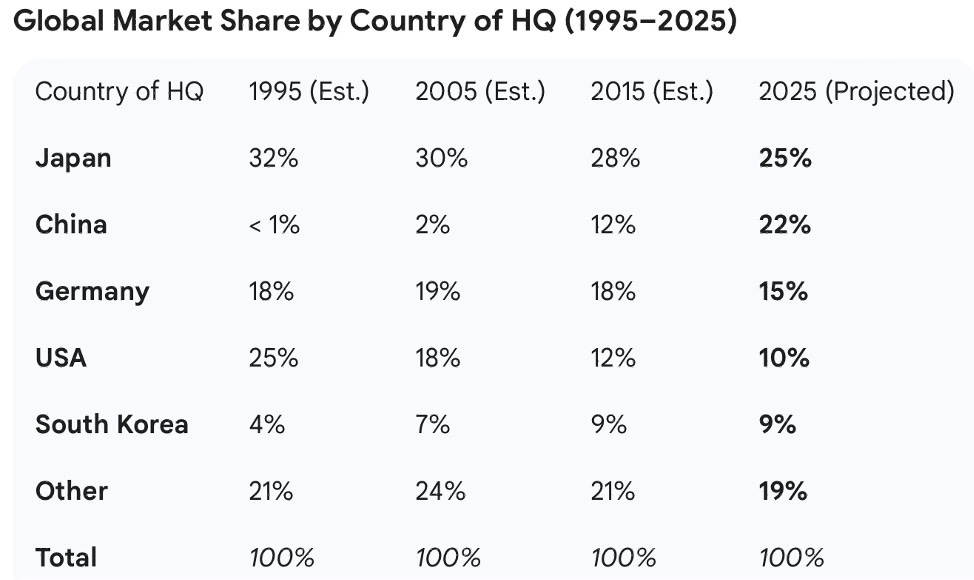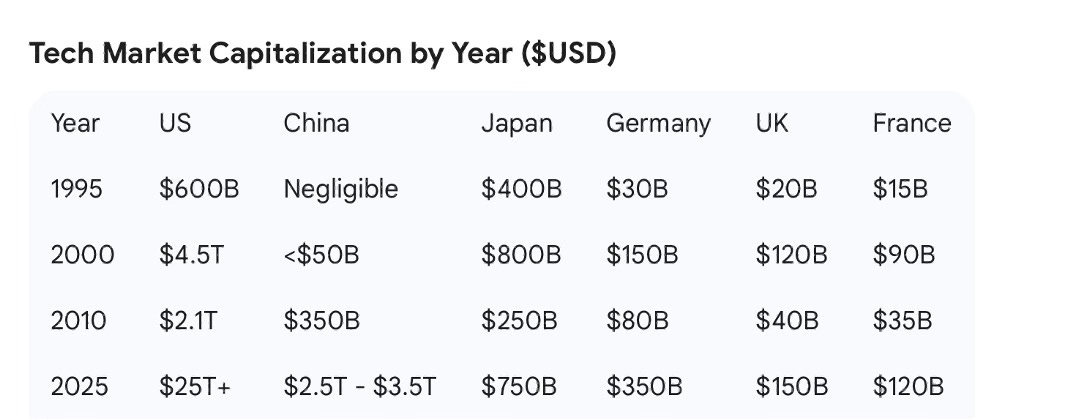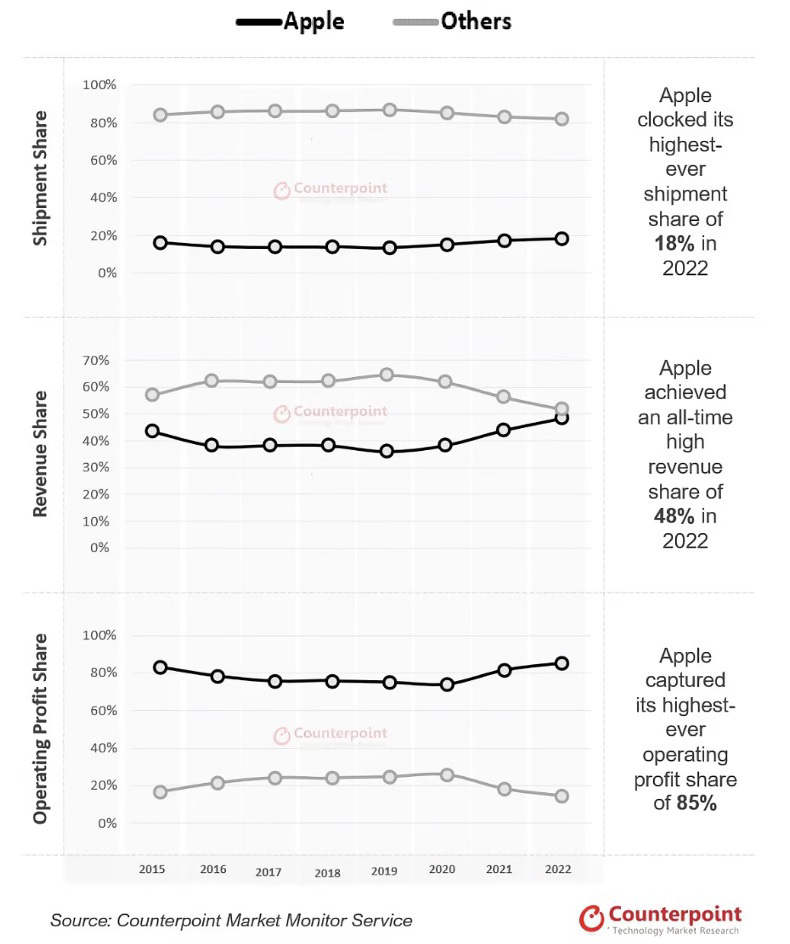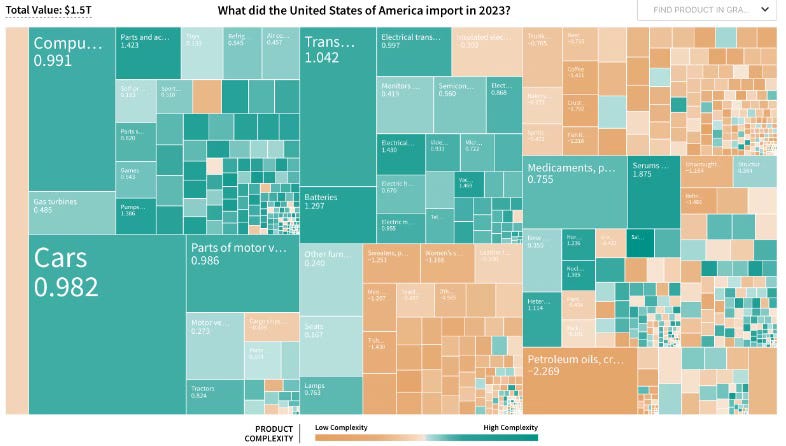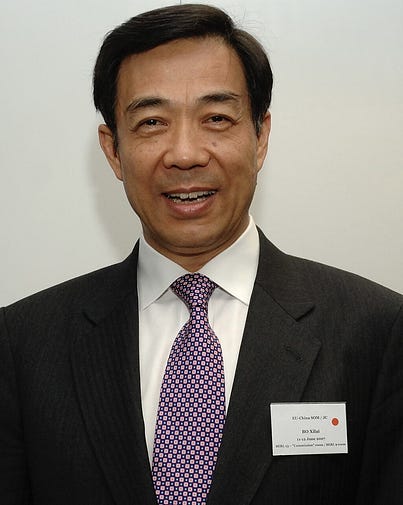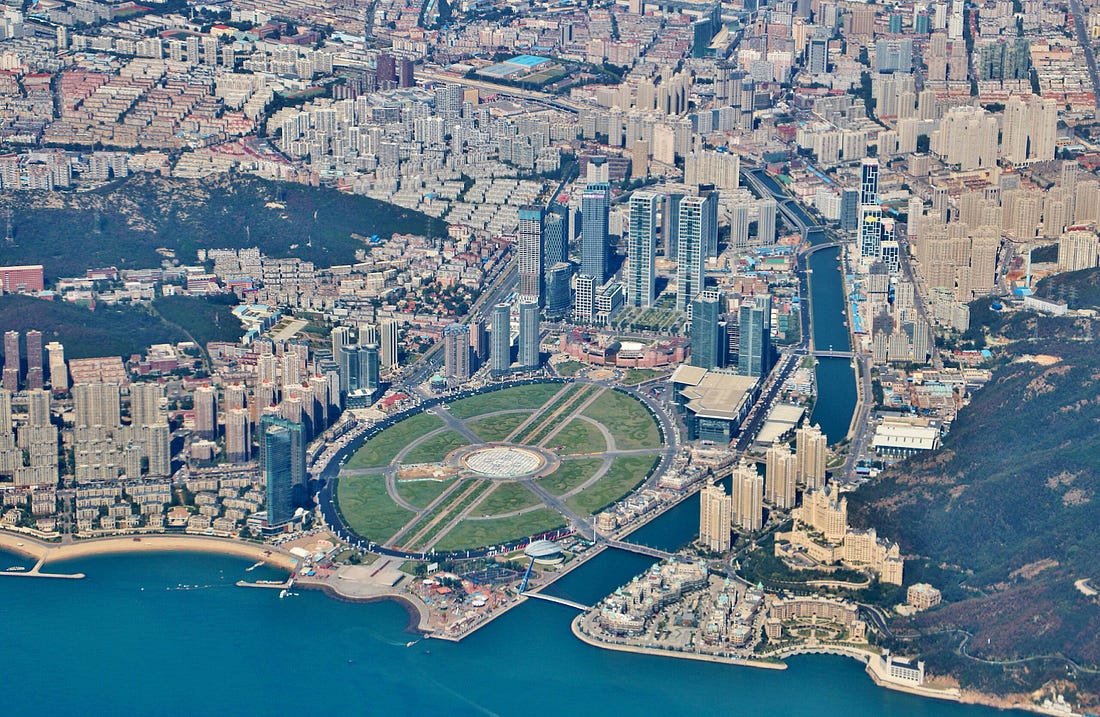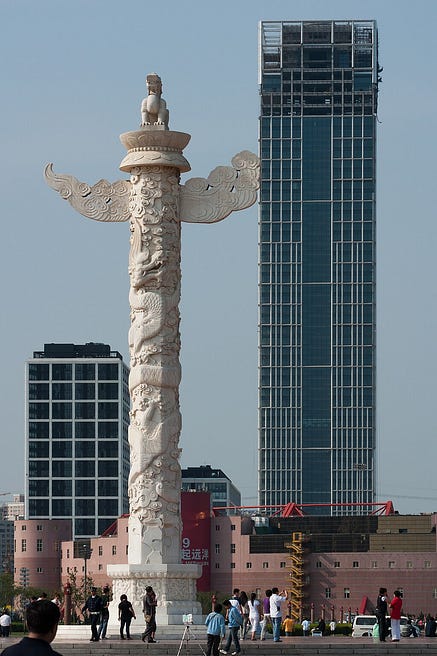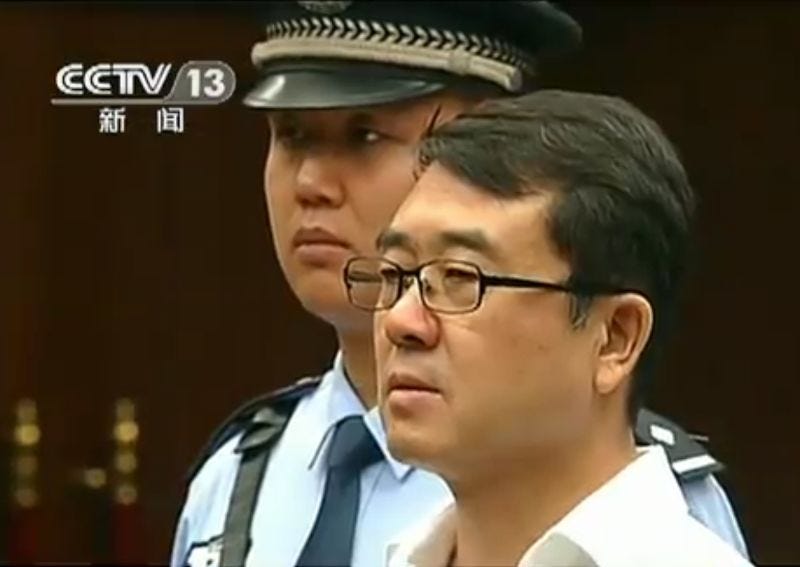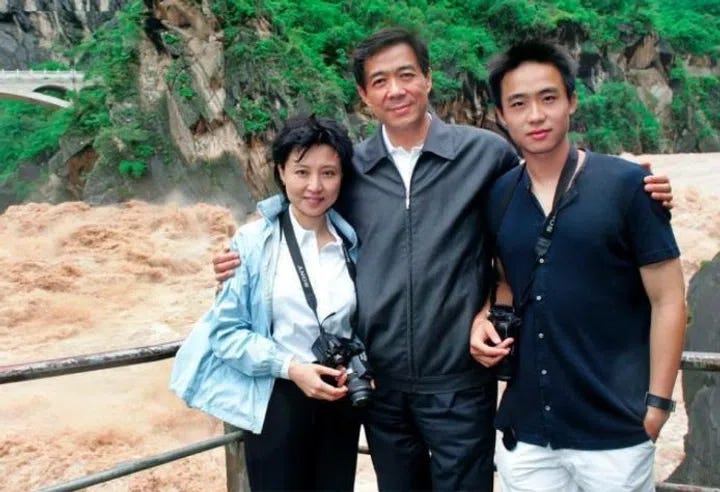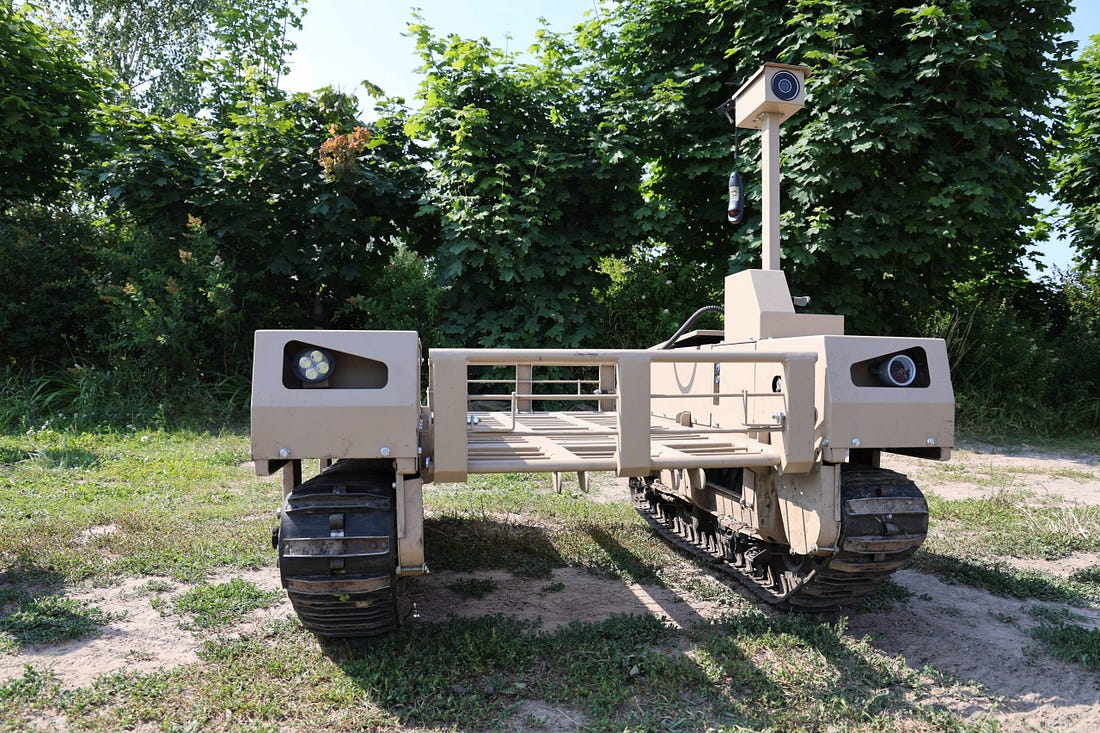Rob Lee, a former Marine and Russia expert at FPRI, has spent significant time on the frontline in Ukraine. He joins Shashank Joshi, defense editor of The Economist and Tony Stark of Breaking Beijing and our newly minted Second Breakfast podcast to discuss the war in Ukraine, technology on the battlefield, and the future of warfare.
Today, our conversation covers:
Whether Ukraine represents a revolution in military affairs and what lessons the war holds for other theaters
Why 80% of casualties in Ukraine are caused by UAVs,
The limits of FPVs and UAVs, tactics to counter UAV attacks, and the role of unmanned ground vehicles,
Institutional friction within the Ukrainian forces,
How Chinese components and commercial drones from DJI are shaping the battlefield.
Drone incidents over Europe, burden sharing, and what NATO is learning from the war,
Plus: what music Ukrainian soldiers are listening to on the battlefield.
Thanks to the Hudson Institute Center for Defense Concepts and Technologyfor sponsoring this show.
Listen now on iTunes, Spotify, or your favorite podcast app.
Jordan Schneider: A defense-tech talking point is that 70% of casualties on the battlefield today are caused by drones. Rob, what should we make of that?
Rob Lee: We should question statistics when they don’t have a clear source, because they anchor our views of modern warfare. Are the percentages authoritative? Are they replicable in other conflicts?
I visited the front line in Ukraine last summer and spoke with more than 15 battalion and brigade commanders, or their intelligence officers (S-2s). I asked each the same question, “What percentage of current casualties are from Unmanned Aerial Systems (UAS)?” 80% was the most common answer, with a range of 75-95%. This is the number cited by senior Ukrainian officials, like Pavlo Palisa.
Artillery and UAS are complementary, so it’s hard to distinguish between them. In many cases, artillery is important for destroying tree lines, which allows UAS to drop grenades on exposed troops. Artillery also helps to canalize Russian units — Russian infantry avoids open fields, sticking to tree lines. UAS can then drop mines to funnel them in a specific direction — there’s a profound psychological effect of having a 155mm or 152mm shell land near you. Artillery isn’t obsolete. Commanders of elite UAS units said that although UAS cause more than 50% of casualties, they do not operate in isolation, and artillery plays a key role.
I think 80% is a decent estimate for the majority of casualties on both sides. It’s impossible to know the exact number. I would caveat that brigade commanders do not see all casualties — some are outside their direct command. They also do not see all Russian casualties from HIMARS strikes, for example. This high percentage also shows Russia adapting to infiltration tactics — they often move only one or two soldiers at a time. Using artillery on a single soldier doesn’t make sense, it is more efficient to use a First Person View (FPV) drone or a Mavic to drop a grenade. 80% is a good estimate.
This number is dictated by the nature of the fighting in Ukraine — the infiltration tactics and the prevalence of dismounted, small-scale infantry assaults are why UAS play an outsized role. In large-scale dismounted infantry assaults, artillery is the main killer. I spoke to the Deputy S2 for a battalion fighting North Koreans in Kursk. He said that during the first days of the North Korean assault, so many Russian Intelligence, Surveillance, and Reconnaissance (ISR) UAVs flew overhead, the Ukrainians couldn’t use their own artillery effectively. Once that changed and they could use artillery again, they inflicted heavy casualties on the North Koreans, forcing them to shift from platoon-sized attacks to smaller, squad-sized units.
Keep in mind, in the next war NATO fights, UAS may not cause 80% of casualties. In a large-scale, conventional war, artillery would likely be the main killer, at least initially. Things have changed dramatically since the 2022 invasion. A brigade commander estimated that in the summer of 2023, artillery caused 90% of casualties. He now believes 80% are from UAS. That shift is important. It is important to ask how this will apply to future conflicts.
Shashank Joshi: We saw an essay a couple of months ago from General Zaluzhnyi, who was the commander-in-chief of Ukraine’s forces. He’s now based in London, away from the front, so take his views with a pinch of salt. In his office, there are banks of video screens where he watches drone strikes from Ukraine. He’s still digitally plugged into the front.
In his essay, he supports the 80% figure and writes that traditional means of protection, like fortifications, armor plating, and even individual body armor, are negated by the scale, lethality, and accuracy of modern UAVs. Someone with a bird’s-eye view of the conflict reached that conclusion.
I agree it’s a mistake to cite that figure without considering the role UAVs play in other operations. Even with artillery strikes, the observation is going to be facilitated by UAVs. I see UAVs and artillery as symbiotic means of firepower, or nearly symbiotic. It would be a mistake to ignore that context.
Tony Stark: Are we talking about catastrophic kills or disability casualties? What is the modern FPV capable of in terms of disabling and disrupting enemy operations?
Rob Lee: Employing armor is very difficult, and UAVs are the main problem. Early in 2023, FPVs were overhyped — they were a new, immature technology. How to employ them wasn’t clear — there weren’t many available radio frequencies, so you couldn’t use many in proximity to each other without signal interference — and there were other issues. FPV capabilities have since matured, and crews are now experienced using this technology.
For vehicle losses, it depends. For units that fought at Kursk, repelling Russian assaults from both the Russian Airborne Forces and Naval Infantry, Javelins played a big role. This is surprising because Javelins have a greater risk at an accurate range. Armor assaults are uncommon now. We are seeing some in the eastern direction where overcast weather limits the ability of ISR UAVs to fly, and Russia is trying to take advantage of that before winter. But many vehicle losses are due to UAS — a combination of remote mining, FPVs, or night bomber UAS.
Social media can be distorting. One of the best night bomber UAV units in Ukraine is the Lasar Group of the National Guard. They have about 90 crews, are extremely well-led, and have a very efficient targeting cycle. According to their internal data, they’ve damaged or destroyed 2,000 tanks and more than 3,000 BMPs or BTRs, and a large number of artillery systems. They mainly operate at night because UAVs are easier to shoot down during the day. Their success has pushed Russia to keep its tanks further behind the front line at night. In June, they destroyed more artillery than the top four or five UAV units combined. But you do not see this because they aren’t posting footage.
For armored assaults, more than 50% of losses are from FPVs or mines dropped from UAVs. Anecdotes are important here. In May, the 20th Mechanized Brigade faced two turtle tanks — well-made by former Wagner fighters. The brigade told me it took more than 60 FPVs to stop those two tanks, and the first tank wasn’t even stopped by FPVs but by its own gearbox, which exploded. The UAV commander said if that hadn’t happened, the tank would have made it to their front line — it was that well-built. There’s a video of the tank afterward with a lot of FPVs stuck in the external wiring, none of which stopped it. The vast majority of vehicle and infantry casualties are from UAS.
Tony Stark: There is a discussion about battlefields becoming more transparent with modern technology. I’m not sure I agree. How do you conduct surprise at the tactical and operational level, given those circumstances?
Rob Lee: The last time there was an operational surprise was the Kursk offensive. The Kursk operation is interesting for a bunch of reasons, but the operational security was very tight. My understanding is that General Syrskyi led it himself, taking direct command. The brigade commanders had to sign non-disclosure agreements — they weren’t allowed to tell their superior command that they were moving to Kursk.
The reconnaissance was compartmentalized. There are a lot of lessons for us about how to conduct such an operation, but also what you can and can’t tell subordinates before an offensive. Most of the soldiers who were moved to Sumy thought they were defending, not preparing for an offensive operation. That was the last time we’ve seen a real breakthrough. At the time, Russia didn’t have strong UAS capabilities in the area. The Russian units there were not well-trained — they were conscripts. They had built good fortifications, but they weren’t tied into a coherent defensive system.
Since then, we’ve not seen an offensive breakthrough or much success on either side. Ukraine has made some attempts — in March, there was an operation in Belgorod to relieve pressure on Kursk. In April, they conducted an operation towards Kursk with some of their best assault units, including the 225th and 425th assault battalions, and ran into substantial issues there. Without the element of surprise, success is difficult.
Neither side can achieve air superiority or effectively leverage aviation to set the conditions for breaching well-fortified defenses. My view is that success depends on degrading, suppressing, and destroying UAS teams. The reconnaissance and fires aspects are also key. Both sides are prioritizing those, but neither has successfully set the conditions to take more than a village or launch a small-scale tactical assault.
Modern communication technology also complicates the situation. Everyone has a cell phone — you can’t really prevent people from having them, so you have to plan with that in mind. Both sides know their soldiers will call home — both sides have signals intelligence capabilities and listen in on those conversations.
Commanders sometimes lie to their soldiers, saying, “We’re getting rotated off the front line, we’re going this direction,” to misdirect their adversary. Both sides are using deception tactics.
Jordan Schneider: Why don’t they ban cell phones then? Are cell phones necessary for communication, or is it that in 2025, you can’t send someone anywhere without one?
Rob Lee: Cell phones are used for military communications — probably too often — and this is true on both sides. If you go to a command post, you’ll see Discord and Google Meet open. I know soldiers who use Google Meet to talk to a drone pilot during a firefight. On the Russian side, Telegram is often used to overcome their internal communication problems.
Both sides are scaling up their Signals Intelligence capabilities. I do not know enough to speak intelligently about it, but it’s clear they pull a lot of data. A big priority now is figuring out how to sift through all this data quickly and make it actionable. That will be a major focus of AI and machine learning development for the military — how to turn raw information into intelligence.
Shashank Joshi: The cardinal principle has always been that it is easier to persuade an adversary of what he already suspects than to introduce a new idea. We saw this in the planning for D-Day and the Normandy landing. A key element of the Kursk offensive was the ruse that Belgorod was the real target — that deception boosted Ukraine’s chances.
Deception is a fascinating topic now because it is difficult to pull off in the modern world. Creating false chatter on your comms is an age-old technique, but you have to maintain the deception across all channels of communication. You have to make the Belgorod operation appear real in every way.
On a tangent, Jordan, I know you read widely. R.V. Jones, the wartime British scientist, wrote a great book, The Wizard War.
Jordan Schneider: Oh, what a classic!
Shashank Joshi: He gave a lecture at CIA headquarters in 1993 called “Some Lessons in Intelligence.” It’s a fantastic reflection on the nature of modern deception, taking lessons from World War II and considering how to apply them to new conflicts. I encourage everyone to read it.
Jordan Schneider: Rob, Michael Kofman asked you where the drone swarms are? We’ve now seen soldiers using Xbox controllers to guide drones — it seems like many of these roles could be automated in 5, 10, 20 years. You and Shashank wrote that infantry stationed on the front line for 200 days were instructed not to shoot enemy soldiers crossing their positions. If that’s true, then why are they even there? So, why are humans still sent to the battlefield? From what you’ve seen, which roles will be automated first, and what tasks will still need a person on the ground?
Rob Lee: I’ve been hearing people say we’re going to have swarms “this year” for the last two years. There is a Ukrainian company called Swarmer working on this — the Wall Street Journal wrote an article about them a few months ago. I do not know the full extent of their success. There is often a lot of talk about AI in a swarm, but “AI” is often a misnomer. In many cases with FPVs, there’s a form of terminal guidance where, once the camera is on something, you can click a button and it will more or less follow the target. That will mitigate the loss of the video feed. I wouldn’t call it AI, but some people do.
I know there are attempts to improve a UAV’s ability to read terrain and target on its own, without a human in the loop. I think the goal is being able to send a UAV into a grid square and have it locate targets on its own. I do not know how soon that will be. In some ways, it’s less important for Ukraine right now because they are mostly targeting Russian infantry, one or two guys at a time. You do not need sophisticated AI for that.
I do not think we should assume infantry will be obsolete anytime soon. You still need someone on the ground to hold territory. It is an interesting point about Ukrainian infantry being told not to engage unless they have to. It calls into question what they actually hold — what is the front line? How real is it? Are these soldiers an observation force, even though they aren’t fighting all the time? I’m not sure how to describe their role.
One of the problems recently is that the maps we use for Open Source Intelligence are increasingly less accurate. This is not because the cartographers are worse, but because with infiltration tactics — where soldiers are walking 10 kilometers past the front line — it’s unclear what a geolocated reference point means. Does it mean they’re holding the point? Does it mean they just dropped a flag there? The Russians will drop a flag from a UAV and post it publicly so their commanders will think they have advanced further than they did.
One thing we’ve seen throughout this war, as in most wars, is a constant innovation, countermeasure, adaptation cycle. There is a lot of work on creating mesh networks and on creating UGVs and UAVs that can operate and bounce signals off each other. Some people are skeptical of that. Part of the issue in Ukraine is that only a few companies, like Silvus, make radio signals that are strong enough to create a mesh network, and they’re expensive and only available in low quantities, making it cost-prohibitive. There are other adaptations, like using cell towers near the front line to improve 3G connections.
Using UAVs and Unmanned Ground Vehicles (UGVs) is still a manpower-intensive activity. An FPV team is normally four soldiers, and you have to constantly rotate them out. UGV teams may be larger. When Ukraine conducts an assault, the task organization for a 4-8 man assault group will include an FPV team, a night bomber UAV team, and two Mavic teams in support. That’s four UAV teams supporting a 4-8 man infantry team. The ratio of UAV operators to infantrymen in those cases is 2-to-1 or 3-to-1.One of the big questions going forward is what that ratio should look like for us. It’s not clear what the perfect ratio is. It’s also difficult because Ukrainian brigades are mostly defending. They’ve been defending for two years, few units have recent offensive experience, and the technology keeps changing. Assault units are compensating by fielding more UAV operators than infantrymen in operations.
Jordan Schneider: Why does it take four people to run a drone team? And why can’t the pilots be a thousand miles away?
Rob Lee: The pilot can be a thousand miles away. That’s one of the unique things. Operation Spiderweb was conducted by pilots in Ukraine, hitting targets all across Russia. The Lazar group’s pilots operate from Kyiv to deploy the drones to the front line, hundreds of miles away. In reality, we could have pilots in America piloting UAVs in Ukraine right now if we wanted to, though there would be some interesting legal implications. We’re moving in a direction where pilots can operate far from the front lines.
For FPVs, it’s typically a team of four because they deploy relatively close to the front line. You have to have someone deploying the UAV somewhat near the front. One person will be an engineer in charge of the munitions — depending on the target, you want to use a different munition, and you have to know how to use the initiator properly. A lot of people have lost hands or been killed by improperly assembling FPVs, as many munitions are homemade. So, one person is an engineer. The pilot and co-pilot roles are interchangeable, but the co-pilot often navigates. You’ll often have a fourth team member flying a Mavic to spot the target and talk the FPV onto it. It could even be more than four people. You might have one person managing antennas, and another as a driver. They often have to walk the last two or three kilometers to their position without a vehicle, so you need enough people to carry all the equipment.
With UGVs, maintaining communications is difficult. You often have to have a UAV acting as a repeater for the signal to the UGV. You also need the UAV for the pilot to see, because looking from the UGV’s camera on the ground, you do not see very much. You also need a maintenance person and other support. Ukraine is looking at creating UAV battalions in all its brigades. They’re forming UGV companies that might become battalions. We’re talking about hundreds of people. The task organization and the table of organization for these units are changing, and it’s going to have to change for our military as well.
Shashank Joshi: When we talk about swarms, people often think a swarm is a lot of UAVs all at once. That’s not what it means in a technical sense. A swarm is when each UAV is communicating with the others — there’s a degree of coordination within the group. The technical case for this is clear — you can overwhelm an adversary and also minimize the amount of pilot involvement. Imagine a single pilot able to select a target and launch hundreds of UAVs that can then autonomously approach it.
We have missiles that can do this. The Brimstone missile, that the UK has provided to Ukraine, is an example. Ukraine fires them off trucks, which I’m not sure the UK is even capable of doing. Those Brimstone missiles, which were designed about two decades ago, can each observe what the other is doing. If one missile picks a tank, another missile in the swarm can pick a different tank, so you’re not wasting munitions on the same target. That’s the fundamental appeal, along with saving pilot capacity.
The problem is that physics is a thing. If there is intra-swarm communication, how is that message being sent from one airframe to another in flight? Typically, there will be some kind of radio signal. It may not be subject to the same jamming as the main control signal because it will have a different frequency and strength, but you still have to send these signals between drones that are close to one another. When you get to a large number of UAVs in flight, there is more interference, and you struggle to send signals. This is a problem with all uncrewed systems — theoretical capabilities are different from practice. The simple issue of getting messages to and from the drone is at the heart of the operational limitations.
Rob Lee: Weather also plays a bigger role for UAVs and UGVs than it does for artillery. It is a consistent problem, including for the Starlink systems used in many of these UAVs. As Shashank is saying, there are so many basic problems that come up that make this much more difficult than people imagine.
Tony Stark: Autonomy on the battlefield is an iron triangle between capabilities, cost, and survivability. Capabilities include both effectors and sensors, as well as computing power. Cost includes not only the price of a single system but also industrial scaling. Survivability isn’t just about surviving enemy fire, but also about resistance to dust and required maintenance. Trying to get that equation right in a swarm is really hard. You can have effective, jam-resistant means of communication, but that also makes the swarm cost more than you want at a tactical level. When you actually see a swarm on the battlefield, it will be because someone has solved that equation.
Jordan Schneider: Or solved it for a point in time until the adversary adapts. The underlying question is whether we’ve lived through a revolution in military affairs. Even if advanced AI can replace pilots, you still need someone nearby to set up the system — drones can’t fly that far without trade-offs.
Shashank Joshi: When you’ve made a system that has a long range, can operate in all weather, is jam-resistant, can communicate with other aircraft in a swarm, and has a large payload to cope with up-armored defenses — congratulations, you’ve invented a cruise missile. You can do it cheaper than existing cruise missiles, but at that stage, you have only invented a very decent cruise missile.
Tony Stark: I saw a video over the weekend of a Ukrainian soldier being evacuated by a UGV. I’ve heard reports of this for a while. As a former infantryman, the idea of an unaccompanied wounded soldier being evacuated by a UGV makes me uncomfortable, but I understand operational necessity. How common are UGV evacuations? Is that the best use for them right now? How does it compare to other applications?
Jordan Schneider: Is a UGV a ground robot that can walk like a dog, or is it a little truck?
Shashank Joshi: Normally, they trundle along on treads instead of ambulating.
Rob Lee: UGVs have become a significant focus for Ukraine this year, primarily to offset their shortage of infantry personnel and reduce casualties by taking over dangerous missions. Roughly 90% of UGV missions are logistics — last year, probably 70% or more of UGVs were procured for this purpose. Some units that invested in this technology early, such as the 3rd Assault Brigade and the Khartia Brigade, are more experienced in their use, but adoption is becoming common across all units.
UGVs excel at transporting heavy equipment — up to 300 lbs of ammunition, food, and water. They can carry items that are too heavy for UAVs, such as a .50-caliber machine gun. This ground-based logistical support complements the use of night bomber UAVs, like the Vampire drone, that were previously the main method for resupply. Now, it is common for the engineer sections within Ukrainian brigades to operate both UGVs and night bomber UAVs to support their battalions.
While UGVs have been tested as remote weapon systems, their use in direct combat is challenging. The camera often shakes, making it difficult to aim, and an observation drone is usually needed overhead to confirm where rounds are landing. More critically, signal loss is a frequent problem. UGVs are vulnerable targets — they’re smaller than a truck, but big enough to be easy targets, and Russian forces constantly hunt them with FPV drones. Both sides heavily target roads and supply routes, and any vehicle spotted — be it a truck, an infantry squad, or a UGV — will be attacked. UGVs are often hit.
UGV casualty evacuations are becoming more common, though I’m not sure of their scale. Many brigades reserve this function for extreme situations where the UGV is the only viable option, such as reaching a wound that cannot be treated at the front line or accessing positions that are nearly impossible to get to otherwise. There are reports of soldiers with catastrophic injuries, including lost legs, remaining at the front for days or weeks before evacuation is possible.
The main risk for these missions is signal loss. A disconnected UGV can leave a wounded soldier stranded, alone on the battlefield. There are videos of Russian FPVs striking UGVs during an evacuation and then dropping grenades on the wounded soldiers, highlighting the danger of these missions.
The fundamental challenge for all UGV operations is maintaining a stable signal. Unlike UAVs, which operate high in the sky with a clearer line of sight to their antenna, UGVs are on the ground where the Earth’s curvature, terrain, and obstacles consistently interfere with the signal. To overcome this, operators often need a UAV to fly overhead and act as a signal repeater. Some UGVs are equipped with Starlink for satellite communication, but Starlink doesn’t work under tree cover or in forests. These necessary redundancies make operating UGVs more complex and expensive.
Successful UGV deployment requires more meticulous route planning than for UAVs. The operator must balance the need for concealment from enemy drones with the need to maintain a clear signal, as the very features that hide the UGV can also block its connection. While some units deploy ground-based signal repeaters from elite manufacturers like Silvus, this is a costly solution limited to specific areas. Ultimately, a UGV’s effectiveness is limited not by its battery life, but by its signal range, which is shorter than that of a UAV.
There is a significant need for a terrain-mapping system that would allow UGVs to navigate autonomously, but this technology is underdeveloped. For now, their applications are mostly logistics, with some casualty evacuation and limited remote weapon use. Mine-clearing and demining are also valuable roles for UGVs. Additionally, they are used as “kamikaze” drones; some small units are used for this purpose, but in more extreme cases, UGVs have been loaded with 500-pound aviation bombs and driven into targets like bridges to destroy them.
Shashank Joshi: These systems are being used extensively elsewhere — the Israel Defense Forces (IDF) have used them in Gaza. For them, it is an easier task, as Gaza is a much smaller piece of ground — the entire territory would represent a minuscule patch of the Ukrainian front line. That makes visibility and communications easier. The IDF has used UGVs for a variety of missions, patrolling, sentry duties, setting explosives to breach targets, and the long-standing UGV task of mine and bomb clearance. Ukraine isn’t the only testing ground where we are seeing these developments.
Tony Stark: How many of these lessons are European allies and the American military absorbing? The US seems willing to adopt only the convenient lessons. How much does this translate into budget and policy changes, rather than just a discussion in military schoolhouses?
Shashank Joshi: We need to ask two questions. First, whether we are living through a true revolution in military affairs or seeing incremental changes that, while tactically important, are not a transformation of warfare. Second, which lessons from Ukraine are relevant to other conflicts, and which lessons are unique to Ukraine? These debates are ongoing, partly because we do not know the context of the next war, but also because the answers themselves are unclear. Different observers reach different conclusions.
At the tactical level, the British are in an interesting position with regard to Ukraine. Like the US, they have supported Ukraine at the theater and strategic levels, helping train and advise Ukrainian forces from European headquarters and maintaining a close relationship with the Ukrainian high command. But British forces have been tactically involved inside Ukraine to an extent that the US hasn’t. When I look at British Army training and doctrine, I see an effort to absorb lessons from Ukraine on force organization, the structure of squads and companies, and how to build more effective “kill webs” in an environment of constant surveillance.
The UK is still reluctant to adopt the Ukrainian model of warfare. Admiral Sir Tony Radakin, the UK’s Chief of the Defense Staff, said, “We would not fight like Ukraine. The British way of warfare is rooted in an expeditionary and maneuverist mindset.” He has suggested the UK would prefer to fight like Israel, citing the Israeli attack on Iranian sites using long-range air-launched missiles.
Jordan Schneider: Everyone would like to fight that way.
Shashank Joshi: That’s the criticism. You may not be interested in positional warfare, but positional warfare is interested in you.
Last summer, the British Defense Review stated that ~10% of new spending should go toward innovative projects. A source involved in that review later regretted its vagueness, because it allowed existing systems like the F-35 fighter jet and attack submarines to be mislabeled as “innovative capabilities” — the exact interpretation the authors wanted to avoid. The lessons from the Ukraine war are part of an ongoing intellectual debate. There is no consensus on new ways of fighting, or different equipment and spending patterns.
Jordan Schneider: Describing it as an “intellectual debate” is generous. The real question is whether you are being serious about it. What would be your barometer for gauging if institutions are responding to this war with appropriate seriousness and first-principles thinking?
Shashank Joshi: If you look at what NATO does, you do see lessons being learned. For example, NATO has contracted Palantir to build the Maven Smart system, a digital targeting web that can fuse intelligence from different sources. It is a command and control system that brings us closer to the vision of “any sensor, any shooter” that we’ve discussed before.
General Chris Donahue, head of Allied Land Command, is developing the “Eastern Flank Deterrence Line,” which invests in low-cost interceptors and firepower and merges them into a Ukraine-like system. But they’re concerned that current UAV systems may be obsolete in 18 months — should they buy today’s models or wait for tomorrow’s? NATO thinks it needs to invest in the command and control systems that allow it to deploy UAVs most effectively.
For me, the true test would be if armed forces are running exercises, simulations, and modeling that test a wide range of scenarios. If Ukrainian officers visit these exercises and recognize elements of their own fight, and see it as a serious effort, that would be a measure of success.
Jordan Schneider: The split screen in my head is that we need to have less DEI and more warrior culture and to start a war with Venezuela. Thoughts on all of this?
Rob Lee: According to my contacts in the US military, they are trying to learn from Ukraine. I’ve noticed younger service members often see developments in Ukraine on social media platforms like Twitter and Telegram. Older senior generals are less plugged into this open-source information and may be missing key developments, like the role of FPVs.
European countries are making this a priority. The UK is focused on it, and I hear Denmark is as well. The Baltic countries know this war is directly relevant to them. But there are legitimate questions about how these lessons apply to a different kind of war, such as one against China in the Asia-Pacific, which is the US Marine Corps’ focus.
For European defense, if Russia is the main threat, then Ukraine is the ultimate teacher. Ukraine demonstrates daily what is and isn’t effective against the Russian military. The sense of urgency in Ukraine, that exists nowhere else, drives adaptation. There is a lot we should be learning, including that FPVs are here to stay. Other low-cost adaptations, like using a small number of helicopter crews to shoot down thousands of Shahed drones with a significant success rate, are things we should at least be practicing. Ukraine is doing this for a reason.
Russia also keeps adapting and innovating — scaling up its UAV force and creating an unmanned systems force. Elite units at the Rubicon Center, a very effective organization, are responsible for all unmanned systems development — UAVs, UGVs, and naval drones. They have at least eight or nine combat detachments in Ukraine and are constantly spreading lessons and innovations, and using analytics to inform their research and development. This unit is a priority for funding and personnel. The Russian military we see in the future could look very different from 2023.
The innovation cycle in Ukraine is very quick, and both sides are learning. Anytime Ukraine develops an adaptation, Russia copies and learns from it faster than we do because the lessons are more painful for them. I guarantee you, Russia learned more from an embarrassing operation like “Spiderweb” than we did. They’re probably already thinking about how to conduct a similar operation against European countries. In some ways, any new Ukrainian innovation eventually becomes a threat to us, because Russia will learn from it and could apply it against NATO. There’s a tremendous amount to learn, but countries are learning.
Jordan Schneider: We’ve now seen drones fly over airports all over Europe, which is an alarming development. I remember shortly after it happened, you said on a podcast with Mike Kofman that everyone should be aware that this could happen anywhere in the world. It’s shocked me that there isn’t a sense of urgency, at least in America, to install drone defense systems around airports or elsewhere. Shashank, are you surprised Putin’s play hasn’t triggered more concern? Describe the response so far.
Shashank Joshi: There’s a genuine attribution problem here and an intelligence gap. When you speak frankly with officials, they suspect the drones in Europe were Russian activity, but for the drones on the US East Coast last year, they also believe an element of mass hysteria was involved. Distinguishing real threats from false alarms is difficult.
Two weeks ago, I interviewed Mark Rutte, the Secretary-General of NATO, and pressed him on why they could not confirm these drones were Russian. It became clear that they do not know. The official line is that the investigation is ongoing. This suggests one of two possibilities, either the intelligence is so highly classified that they can’t publicly attribute the drones to Russia — rendering the information useless because it can’t trigger a public response — or there is a genuine lack of intelligence.
Another factor is that even if you suspect the drones are Russian, you have to be very careful about shooting them down. As we speak, the British Defense Secretary is loosening the rules of engagement to allow more shoot-downs of drones over military bases. But, imagine if downed UAVs fell on a village or a vehicle, killing or injuring civilians, it would be a political scandal 10x worse for the minister in charge than the fact that a hostile state flew a surveillance drone over a base. The political incentives are a major constraint.
There’s also an economic problem — how do you develop cost-effective interceptors? How can you shoot down enough drones without depleting the stock of interceptors needed for wartime? This is less of a problem for a few quadcopter sightings over a base, but it is a critical concern for decoy drones flying into a country like Poland. You can shoot down one or two, but expending your entire stock of air-to-air missiles on these drones is a strategic win for the Russians. We desperately need an alternative solution.
I am seeing those solutions emerge in the form of low-cost interceptors designed by various companies, as well as other means of interception, including directed energy. Progress is being made. But this isn’t only a technical problem; it’s also a problem of political incentives.
Jordan Schneider: When you are talking to people on the front, does China come up? Is it a relevant variable in their calculations? Are they annoyed or confused about China’s role in the conflict?
Rob Lee: The UAVs — either as complete systems or components — are mostly coming from China. The DJI Mavic is arguably the most important UAV in this war, particularly the Mavic 3, the Mavic 3T, and now the new Mavic 4 line. Autel, another Chinese company, also produces common quadcopter-type UAVs. These drones are used for reconnaissance and for dropping grenades. They’re cheap, costing only a few thousand dollars, and the Mavic 3T, with its effective thermal camera, is the main reconnaissance system for nighttime operations.
A critical technical step for Ukraine is that they have to hack, or “jailbreak,” the firmware for every Mavic they use. The standard DJI software reveals the operator’s location — this feature needs to be disabled before use on the front line. The Ukrainians report that the Russians receive their Mavics pre-jailbroken from China, whereas Ukraine has to do it themselves for every Mavic. In March, Vadym Sukharevsky, commander of Ukraine’s unmanned forces, estimated Russia had a 6-to-1 advantage in the number of Mavics, which he considered significant. The supply of drones is a major issue. A Ukrainian brigade commander in the Pokrovsk area told me that the biggest problem for adjacent units was a lack of Mavics, even more so than ammunition shortages.
China is also the source for fiber optic cables, with supplies reportedly increasing significantly this year. These cables can be used to make FPV drones immune to electronic jamming, which is a key advantage. Russia is also operating several new UAVs, such as the Garpiya — a knockoff of the Shahed drone — and other modern kamikaze drones like the VTU, which are built with Chinese components.
While China isn’t providing direct military equipment like ammunition, its role in providing dual-use technology is a major advantage for Russia. Ukrainian commanders know they’re at a disadvantage because Russia can procure these systems from China so easily. Ukraine also sources engines and other components from China, but its procurement process is more difficult. While China hasn’t provided direct military aid, given the dominant role of UAVs in this war, its support is an important factor.
Jordan Schneider: China’s Foreign Minister, Wang Yi, reportedly told some European diplomats, “If we were actually supporting Russia, this war would have been over years ago.” Shashank, what are your thoughts on that comment?
Shashank Joshi: He is being cocky — raw industrial capacity alone is not the recipe for victory. But there is a kernel of truth to his point. We spend a lot of time analyzing what China is giving Russia and how close it’s come to providing direct armed support. On certain systems, such as armed UAV designs, China has arguably crossed that line. Even if China isn’t transferring the explosive payload, it’s transferring UAVs designed to be armed. But it isn’t happening on a decisive, war-winning scale compared to what Russia is producing itself — it’s a niche capability.
There was a moment in this conflict where Russia could’ve been in a more difficult position. Had the Ukrainians been able to press their advantage in late 2022, or if the 2023 offensives had gone differently, Russia could’ve been in serious trouble. I think if the Russians had been facing a potential collapse, China would’ve been more likely to step in. They had the stockpiles and the industrial capacity to fill many of Russia’s needs for basic artillery and other systems.
The reason they didn’t is twofold. First, the threshold for engaging was very high because it would’ve meant blowing up their relationship with Europe, which the Chinese want to protect. If they were going to take such a drastic step, it would’ve to be out of necessity, and it was not necessary. We know the Russians gave wish lists to the Chinese early in the conflict, and the Chinese didn’t provide the bulk of what they wanted, even covertly.
Second, China’s motivation would have been to prevent a major Russian defeat, not to accelerate a Russian victory. If you look at the conflict now, while Ukraine’s forces face problems of corrosion and Russia faces long-term economic troubles, no one would seriously argue that the Russians are on the verge of collapse. As long as that’s true, China has other geopolitical interests to protect. The more uncertain US-China relations become, the more China will try to preserve some flexibility in its relationship with Europe, and that will restrain it from providing all-out military aid to Russia.
Jordan Schneider: Oh my god, the UK-China spy scandal.
Shashank Joshi: Crazy, crazy story. Total mess.
Jordan Schneider: Absolutely.
Shashank Joshi: I can’t tell you definitively why this case collapsed. Initially, my gut feeling was that the Crown Prosecution Service — which is independent from government leadership, unlike in the US, I’m sorry to say — dropped the case because government witnesses wouldn’t testify that China is a national security threat. This is a requirement under the arcane 1911 Official Secrets Act used to charge the two individuals. If the government wouldn’t provide a robust assertion that China is a national security threat to satisfy the Official Secrets Act, then I could see why prosecutors dropped the case.
But after seeing the government’s evidence — specifically the three witness statements by Matthew Collins, the Deputy National Security Advisor — that explanation doesn’t hold. Those statements lay out the full spectrum of Chinese espionage. They discuss China’s authoritarian status and the challenge it poses, its influence operations, and its willingness to co-opt people early in their careers to influence policy, not just steal secrets. Taken together, I do not know what more the prosecutors could have wanted. They claim they were only 5% short of what they needed for a potential conviction, but I can’t imagine what more they needed.
Jordan Schneider: It’s wild and ridiculous. I’m not a UK legal expert, but it seems like there was a political decision to pull this case. I do not see another explanation.
Shashank Joshi: No, I do not think that’s true. We should not underestimate the Crown Prosecutor’s (CPS) independence. Prime Minister Starmer is a former Director of Public Prosecutions and former head of the CPS. He is strictly by the book on these matters and wouldn’t quash the case behind the scenes. That’s not how the system works.
It’s possible they decided to withhold evidence to avoid declaring in open court that “we are petrified of China and China is a massive national security threat.” But the witness statements do not soft-pedal the threat from China, if they were trying to avoid a diplomatic row, these are not the statements they would have provided. I think the prosecution was overly risk-averse or incompetent.
As this was going on, the government was grappling with its broader position on China, including the major decision to approve the new Chinese Embassy in East London. The proposed site is the former Royal Mint, where the Opium Wars ransom was taken in the 1840s. Amazingly, this detail has not been picked up by the British press. I find it incredible that the Chinese want to build their gigantic, Bond-villain-style mega-embassy on that exact spot. That decision was delayed again, and we are back in limbo, with the Chinese threatening grave consequences if the project is not approved. The hot potato has been kicked down the road again, to mix metaphors.
[note: this show was recorded before Trump announced sanctioned on Russian oil]
Jordan Schneider: We will have to check on this again in a month or two. It seems likely the Trump administration will be inconsistent on this issue — wanting a quick solution and being agnostic about the long-term consequences. How much of these high-level summits and political dramas ripple down to the people on the front lines?
Rob Lee: There is an element of this that affects the Ukrainians who are fighting. They want American support, and for some, there is an idealistic view of the US as the leading democratic country and a global supporter of freedom. They see themselves as fighting against authoritarianism and oligarchy, and for democracy. For Ukrainians who deeply American ideals, it’s hard to see the US come short of its values.
For most soldiers, they may be frustrated, but their day-to-day reality is unchanged. The Russians have not stopped attacking. They know that even if the US increased weapons deliveries, it wouldn’t immediately end the war or the threat from Russia. Most Ukrainians are realistic — they understand that Russia will be a long-term threat even after a ceasefire or a peace deal is reached.
Ukrainian soldiers do watch developments in the US. During the Trump-Zelensky meeting in February, I was on the front line and watched the video with a mortar battery commander in his apartment. It was a very awkward moment that no one was happy about. It’s always a strange feeling for me, as an American, to be there and wonder what they think of me and if these events change their trust. In the end, we all recognized that the meeting went poorly and hoped for things to get better. By contrast, I was at the front during the recent Trump-Zelensky meeting in July, and the mood was more positive.
While Donald Trump’s rhetoric changes constantly — sometimes favorable to Ukraine, sometimes very negative — what matters is what the US is actually doing. Since taking office, Trump has continued providing the aid and intelligence sharing that the Biden administration had established. It seems that intelligence sharing is as strong, if not stronger, than it was before. If the US is providing intelligence for deep strikes into Russian refineries, that’s notable. The big policy change was the creation of a system allowing European countries to buy US munitions for Ukraine, and that appears to be continuing. Other systems, like air-launched missiles, are expected to arrive in the next few months.
The rhetoric will go up and down, but if the US continues to provide critical weapons that Europeans cannot produce themselves — like Patriot interceptors and Guided Multiple Launch Rocket Systems (GMLRSs) — and Europe can buy these systems, it’s not the worst-case scenario. Some Ukrainians probably have a lower opinion of the US than they used to, but many still view the US favorably and don’t judge us for Trump’s rhetoric.
The key question is whether the Trump administration will coerce Ukraine to accept Russia’s proposal. If they threatened to cut off Patriot interceptors, GMLRS, or intelligence sharing, that would be significant. But if the US continues to assist Ukraine while stating a desire for a deal, there’s no real policy change.
Shashank Joshi: There are two fundamental points here. First, Donald Trump has not endorsed the Russian demand for land swaps — where Russia would cede claims in Kherson and Zaporizhzhia in exchange for the unoccupied parts of the Donbas. Instead, he favors a freeze in the conflict. I think a freeze could benefit Ukraine, if it’s followed up properly, a view I might not have held 18 months ago.
Second, Trump is still selling the Europeans weapons to provide to Ukraine. I asked NATO Secretary-General Mark Rutte if selling these weapons on commercial terms was less beneficial than the previous policy. He said no, the PURL scheme is at cost price, not commercial terms, and is relatively favorable. So long as those sales continue, and depending on whether you believe systems like Tomahawks were ever seriously on the table, US policy is fundamentally unchanged.
As the Europeans accept more financial burden for arming Ukraine, we need to consider what a European-led peace process might be. If the situation in the spring is unchanged — Ukraine’s position stabilizes after a brutal winter campaign against its energy grid, and Russia continues achieving minimal gains at a high cost — Russia may reconsider its position. Europe needs to have a vision for a peace process. For all his faults, Trump did initiate a peace process, albeit in a cack-handed and ludicrous fashion. Europeans need to accept that reality, but I don’t think the mentality in Europe is ready for that.
Rob Lee: The negotiation on Tomahawks at the last meeting was notable as a signal that Trump was less afraid of escalation than the Biden administration, not because the missiles themselves would be a game-changer. The number of Tomahawks provided would have been small, with minimal effect on the front line.
The important question is what other systems Trump might provide through the PURL system, such as Army Tactical Missile Systems (ATACMS). If his stance is that he won’t offer aid, but will sell whatever Ukraine wants, then some of these systems could be quite useful. The ERA air-launched missile, if it works, is low-cost and well-stocked, and could make Russia’s position difficult.
We focus too much on Trump’s ever-changing, daily rhetoric instead of what the US is actually doing. Looking at 2026, the war will become more costly and risky for both sides. Both economies are strained, while deep-strike capabilities are improving and critical infrastructure is frequently targeted, and casualties are very high. Although Russia is incurring immense losses, it is not clear where its breaking point is — be it economic, political, or in casualties. Russia has an unusually high tolerance for cost. Can Ukraine, a smaller country, continue to bear similar costs?
Shashank Joshi: Key variables on both sides are obscure or finely balanced. Russia’s demands are so draconian, it’s easy for Ukraine to reject them. If Russia offered a reasonable deal and a secure future for Ukraine, the decision to keep fighting would be harder. For now, it is in Ukraine’s interest to run these risks. Victory isn’t guaranteed, but it has a good chance of frustrating Russian objectives and sowing doubt among Russian leadership.
But we should be humble and accept that the balance could tip. After a rough winter, a Russian reconstitution, or a change in European politics — which I do not see on the horizon — the prognosis for Ukraine could worsen. I’m not confident predicting the outcome.
Jordan Schneider: The day after the Trump-Zelensky meeting in the White House, Rob and I discussed this with Mike Horowitz. Rob’s interpretation was the “taco trade,” where nothing changes, Trump doesn’t move in one direction or the other. But in a year, who knows what he’ll think. There’s a chance he could swing wildly, either siding with the Ukrainians and sending the CIA to blow up oil refineries or siding with Russia.
Shashank Joshi: People have to remember it cuts both ways. Trump isn’t taking risks on behalf of Ukraine. But the reverse is also true — he won’t spend massive resources to please the Russians either. If Trump thinks Putin is dragging his feet, he will detach himself. His tendency to retreat from difficult situations cuts both ways. He won’t coerce Ukraine in a meaningful way, because Ukraine still has things to offer him. We need to detach from the swings of Trump’s pendulum and focus instead on the longer trajectory of his vision, which is limiting the US’s exposure.
Jordan Schneider: The likely scenario is that the US keeps selling weapons to Europe and providing intelligence. Maybe there is a 10% chance Trump swings towards Ukraine, and a 10% chance he swings towards Putin. What I count on most is his deep and abiding ADHD. If something is not working, his attention will be diverted before he goes too far in any direction. That doesn’t mean adopting a different strategy — if yelling at Zelensky in the Oval Office does not get him anywhere, sending ICE to New York City will become his new focus.
Jordan Schneider: What is popular in the bunkers in Ukraine? What playlists are people downloading on Spotify before they go into airplane mode?
Rob Lee: You hear Western music. There is a song called “Fortress Bakhmut” that became popular during the battle, and it’s still played. Some songs are made for the military or are about the war.

Jordan Schneider: What genres of music are common? Pop, rock?
Rob Lee: It is the military, so there are probably a lot of metal and a lot of rap, similar to music tastes in the US military. I am sure it varies a bit. There are also a lot of women fighting, and they may have different music preferences. There is a joke that a lot of soldiers, even in the tough branches, like “white girl music.” There is always a love for Lady Gaga or Katy Perry. “Bad Romance” came out right before my Afghanistan deployment, and that became the song of our deployment.
Jordan Schneider: From an entertainment perspective, if they are on these two-to three-month rotations, are soldiers downloading shows on an iPad on Netflix to watch? They can’t be busy all the time.
Rob Lee: For Ukrainians, it depends. The infantrymen who go to the “zero line” don’t have tablets. They probably have phones, but connectivity is limited by heavy jamming, so they’re probably not watching TV. For the soldiers at a command post a couple of kilometers from the front line, everything is available. They can play video games and watch Netflix. If you go into a battery command post, and the movie Delta Force may be on one screen and an Xbox on another. It is a mix of entertainment, similar to what US or UK military personnel do downrange.
Jordan Schneider: Well, if anyone wants to write a review of Battlefield 6from the perspective of someone fighting in Ukraine, I would be happy to run that article.
